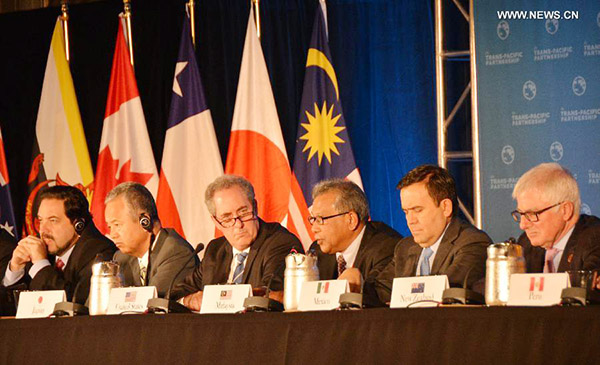 |
|
Trade ministers of the United States and 11 other Pacific Rim countries attend a press conference after negotiating the Trans-Pacific Partnership (TPP) trade agreement in Atlanta, the United States, on Oct. 5, 2015. [Photo/Xinhua] |
Twelve countries, including the United States, Japan, Singapore and Vietnam, signed the Trans-Pacific Partnership Agreement on Oct 5 after five years of negotiations. Since the countries together make up 40 percent of the world GDP, the TPP will have a big influence on China and the global economy.
This has left the international community wondering whether the TPP is a success for the "pivot to Asia" strategy of the US, and whether it will boost Vietnam's economic growth while slowing down that of China. Some even see the TPP as China's greatest economic challenge in the making.
Perhaps the TPP is the US' alternative to the existing trade rules dominated by the World Trade Organization, and it can indeed improve certain rules to the benefit of the US, but cannot solve all its problems. Besides, since its member countries have disputes in many fields, such as agricultural products, automobiles and intellectual property rights, the TPP has to consistently evolve to resolve them.
This is not to suggest that China should ignore the potential impact of the pact on its economy, although confrontation over trade, especially among great powers, is definitely not the adequate way to resolve disputes or differences.
China may not be a part of the trans-Pacific pact now, but that doesn't mean the TPP member states have completely "ignored" it. China has been holding regular dialogues on free trade zones and other trade issues with many TPP members, including Singapore, Malaysia, Vietnam and Brunei that are also signatories to the China-ASEAN Free Trade Area.
True, the trans-Pacific pact will play a vital role in the "pivot to Asia" strategy of the US, and its actual influence on China depends on the details which have not been released yet. Still China should not take the TPP lightly, because it is not a simple free-trade and investment agreement, and is aimed at setting the major rules for world trade and economy.

I’ve lived in China for quite a considerable time including my graduate school years, travelled and worked in a few cities and still choose my destination taking into consideration the density of smog or PM2.5 particulate matter in the region.